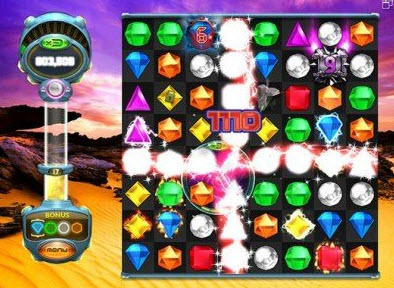 For almost 10 years, PopCap Games has shown it can come up with one hit after another in the casual downloadable games business. One of its titles, Bejeweled, has been played more than a billion times. Now the company’s cashing in on its fame, raising $22.5 million in a first round of funding led by Meritech Capital Partners.
For almost 10 years, PopCap Games has shown it can come up with one hit after another in the casual downloadable games business. One of its titles, Bejeweled, has been played more than a billion times. Now the company’s cashing in on its fame, raising $22.5 million in a first round of funding led by Meritech Capital Partners.
The Seattle-based company plans to use the funds for working capital and potential acquisitions. The company has been profitable since its inception and has 240 employees. Raising capital in such a late stage is rare. On top of that, co-founder John Vechey jokingly referred to venture capitalists as “stupid” last year for throwing a lot of money into games, though he has since tempered that criticism.
The amount of money raised is big for a game company. OnLive, a video games on demand company, recently raised money from AT&T, but it didn’t disclose the amount. Social game maker Playdom is also raising a round now. These deals suggest that video games are on the comeback trail after a relatively slow year for investments compared to 2008, when $936.8 million was raised by game companies.
PopCap is at an interesting crossroads. It has never launched a dud. Its hits include Bejeweled, a jewel-matching puzzle game that pioneered the “try before you buy” business model, where gamers could download a game and play it for an hour. If they wanted to play it for longer, they had to pay $19.99 to unlock it. Bejeweled has sold more than 25 million units, with the try-before-you-buy model and on mobile platforms for lesser fees.
That try-before-you-buy model still persists today, but it has come under price pressure as Amazon.com and others have come into the market and undercut prices. Apple’s rise in casual games on the iPhone has also made thousands of mobile games available for free, or 99 cents.
Beyond Bejeweled, PopCap has had hits such as Zuma and Plants vs. Zombies. The games are typically non-violent, cute, and their appeal cuts across age and gender differences. PopCap has a unique culture and style for developing games. Its headquarters in a Seattle high-rise has game rooms and the owners’ mascot pet roaming the halls. PopCap had a handful of developers work for three years on the Plants vs. Zombies game, which fit into the “tower defense” genre where you have to defend against waves of attackers. The game play proved addictive, and the game has sold more units more quickly than any other game.
Even so, PopCap is under pressure. It hasn’t yet come out with a Facebook version of Plants vs. Zombies. Other casual game companies such as Zynga, Playfish, are making boatloads of money with virtual goods business models on Facebook with casual games. But PopCap has barely dipped its toe in the water.
In a statement, Dave Roberts, chief executive of PopCap, said he was excited to have more working capital that lets PopCap be more aggressive with an expansion into social media and reaching new geographies. He said the company has been pursued for many years by investment firms, but PopCap liked Meritech’s style and sees tremendous opportunity in growing the business at a time when others are retrenching.
Larry Bowman and John McCaw also joined with Meritech in the investment.
While PopCap’s founders previously diversified their holdings by selling some stock to board member Bowman, this is the first time the company itself has raised capital for operational purposes.



